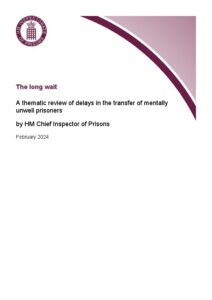The long wait: A thematic review of delays in the transfer of mentally unwell prisoners
This thematic review scrutinises access to mental health care in prisons. In 2022–23, we noted delays in mental health transfers in over three-quarters of our prison inspection reports.
Against a backdrop of rising prison populations and frailties in staffing, HM Inspectorate of Prisons, in partnership with the Care Quality Commission (CQC), undertook this thematic to scrutinise the delays in people accessing care, so that the reasons can be understood and addressed. The review involved fieldwork at 21 prisons to examine the conditions in which those awaiting transfer to a secure hospital are held. We also reviewed the case notes of patients to understand when delays occurred and why.
When we think of prisons, we assume they are full of those who have committed crimes for which they are being held accountable or those awaiting a court judgement. Yet they remain a legal ‘place of safety’ which can be used when there is no suitable provision in the community. Our prisons continue to hold a number of very seriously mentally unwell men and women.
All too often, I meet prison officers and health professionals struggling to care for these patients. To be clear, we are not talking about those who have the will and capacity to accept support during a mental health crisis or when they are at risk of self-harm. These include people whose psychosis or paranoid delusions can make them so violent they are held in isolation in the segregation unit, requiring multiple officers to unlock them just to deliver their meals. Or those so driven to harming themselves they have repeatedly blocked their own airways with bedding, removed teeth or maimed themselves to the point of exposing their own intestines, frequently causing life-changing injuries.
Treatment, assessment and care for patients under the Mental Health Act (MHA) cannot legally be provided in prisons or anywhere outside of a secure hospital. Early treatment for mental health disorders is vital and delays in accessing care that cannot be provided in prison can cause irreversible harm. Given this, the current strain on prison places, and the psychological and physical challenge for prison officers and nurses attempting to care for such unwell people, their prompt removal from prison to secure hospitals should be a priority. But it is not. Instead, people linger in prison for weeks, often months and even, in the worst cases, for more than a year waiting for their transfer to be completed.
See our YouTube videos on ‘The long wait: A thematic review of delays in the transfer of mentally unwell prisoners’ below: (Back to top)
We hope that our findings will encourage immediate action so that acutely unwell people do not continue to suffer further harm awaiting the care that they need and to which they are entitled.

